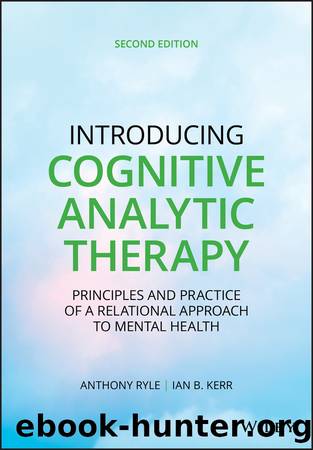Introducing Cognitive Analytic Therapy by Anthony Ryle & Ian B. Kerr

Author:Anthony Ryle & Ian B. Kerr [Ryle, Anthony & Kerr, Ian B.]
Language: eng
Format: epub
ISBN: 9781119695134
Publisher: Wiley
Published: 2020-04-08T00:00:00+00:00
Rating Progress
For TPP 1 there was little recorded change on her rating sheet during therapy for either recognition or revision. Interestingly she wrote on her rating sheet for TPP 2 that âI like being in control!â For this procedure her ratings showed increasingly good recognition but little apparent change. In therapy she continued intermittently to be angry at the therapist for apparently ignoring her symptoms and not curing them and for focusing on her feelings and role enactments. Similarly, she continued to insist until the end of therapy, despite seeming at times more relaxed and able to discuss her feelings and the consequences of her role enactments, that this would never really help. She insisted that she was only going through with it in case she ever needed further help so that it would not be held against her that she had yet again dropped out. She repeatedly accused her therapist of being unempathic and not really understanding her difficulties or helping with them and this was very much the tone of her farewell letter, although she did say that she had found therapy âchallenging.â
Nonetheless, her therapist did feel that by the end of therapy Susan was noticeably more open about discussing her feelings and difficulties and more able to be âin dialogâ and that she was possibly also surprised that this could happen. Parallel to this she reported that her irritable bowel symptoms had curiously diminished. In addition to clinical impressions that her symptoms had diminished, her scores on routine psychometric measures (âCOREâ (see Barkham, Gilbert, Connell, Marshall, & Twigg, 2005) and a standard anxiety questionnaire) also reduced considerably. The âCOREâ reduced from 76 at the start of therapy to 46 at the end with subscale ratings related to anxiety showing a parallel decrease from 36 to 23. At 6âmonth followâup these scores had diminished even further (âCOREâ overall reducing to 34, with the anxietyârelated subscale ratings reducing to 14, with parallel shifts in standard anxiety measures). She wrote a letter 6âmonths postâtherapy saying that things had improved considerably in her life and stated that:
I originally came to you with one set of anxieties and insecurities; these seem to no longer play a large part in my life and, although lonely and isolated at present, I feel there is hope for the future.
Download
This site does not store any files on its server. We only index and link to content provided by other sites. Please contact the content providers to delete copyright contents if any and email us, we'll remove relevant links or contents immediately.
| Administration & Medicine Economics | Allied Health Professions |
| Basic Sciences | Dentistry |
| History | Medical Informatics |
| Medicine | Nursing |
| Pharmacology | Psychology |
| Research | Veterinary Medicine |
Bioenergetica by Alexander Lowen(1122)
Noise: A Flaw in Human Judgment by Sunstein Cass R. & Sibony Olivier & Kahneman Daniel(968)
The Data Detective by Tim Harford(940)
The Child in You by Stefanie Stahl(882)
Chatter by Ethan Kross(797)
The Science of Rapid Skill Acquisition by Peter Hollins(637)
Freedom by Sebastian Junger(630)
No Bad Parts by Richard C. Schwartz(600)
The Montessori Baby by Simone Davies(561)
Evolution Gone Wrong: The Curious Reasons Why Our Bodies Work by Alex Bezzerides(559)
The Quantum Psychiatrist: From Zero to Zen Using Evidence-Based Solutions Beyond Medication and Therapy by Biswas Dona(551)
Maps of Meaning: The Architecture of Belief by Jordan B. Peterson(548)
The Science of Self-Learning: How to Teach Yourself Anything, Learn More in Less Time, and Direct Your Own Education (Learning how to Learn Book 1) by Peter Hollins(519)
Anxiety For Dummies by Charles H. Elliott & Laura L. Smith(512)
Sadomasochism and the BDSM Community in the United States by Stephen K. Stein(497)
Disconnected by thomas Kersting(480)
Why Sex Doesn't Matter by Olivia Fane(480)
The Mechanics of Passions: Brain, Behaviour, and Society by Alain Ehrenberg(480)
Jung - The Key Ideas: Teach Yourself (TY Philosophy) by Ruth Snowden(467)
